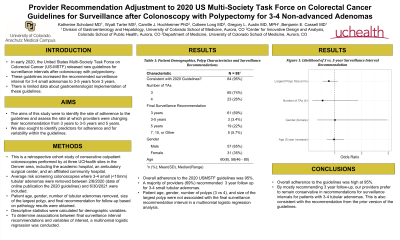Monday Poster Session
Category: Colorectal Cancer Prevention
P1756 - Provider Recommendation Adjustment to 2020 US Multi-Society Task Force on Colorectal Cancer Guidelines for Surveillance After Colonoscopy with Polypectomy for 3-4 Non-Advanced Adenomas
Monday, October 23, 2023
10:30 AM - 4:15 PM PT
Location: Exhibit Hall

Has Audio

Benjamin E. Cassell, MD
University of Colorado School of Medicine
Aurora, CO
Presenting Author(s)
Katherine Scholand, MD1, Wyatt Tarter, MS2, Camille Hochheimer, PhD2, Colleen Long, MD1, Gregory L. Austin, MD, MPH3, Benjamin E. Cassell, MD4
1University of Colorado, Denver, CO; 2Colorado School of Public Health, Aurora, CO; 3University of Colorado, Aurora, CO; 4University of Colorado School of Medicine, Aurora, CO
Introduction: The US Multi-Society Task Force on Colorectal Cancer updated its guidelines on surveillance following polypectomy in early 2020. For patients who underwent polypectomy of 3 to 4 small adenomas (< 10mm), the recommendation was changed from surveillance colonoscopy at 3 years to 3 to 5 years. We sought to assess the rate at which providers were changing their recommendation from 3 years to 3-5 years and 5 years.
Methods: This was a retrospective cohort study of consecutive colonoscopies performed at 3 UCHealth facilities, including the academic medical center. Average risk screening colonoscopies with 3-4 small adenomas were included from 2/6/2020-6/30/2021. Patient age, gender, 3 vs 4 adenomas removed, and size of the largest polyp were all assessed.
Results: During the studied time, there were 88 procedures with 3-4 tubular adenomas. There was 95% overall adherence with the surveillance interval of 3-5 years. Twenty two of the 88 received a surveillance recommendation of either 3-5 (n=3) or 5 (n=19) years. We assessed whether any patient or polyp factors were associated with receiving a surveillance interval of 3 years compared to 3-5 or 5 years. Patient age, gender, number of polyps (3 vs 4), and size of the largest polyp did not impact the final surveillance recommendation interval in a multinomial logistic regression analysis.
Discussion: While 95% of surveillance intervals remained within guideline recommendations for 3-4 small tubular adenomas, a majority of providers kept with a conservative recommendation of 3 years (69%), which is also in line with the prior 2012 guidelines. This in contrast to our recent published review of adherence to the new guidelines for 1-2 small adenomas, which showed 84% overall compliance with the new guidelines shifting to a longer interval of surveillance of 7-10 years from 5 years(1). This suggests that our providers may prefer to remain conservative in recommendations for surveillance intervals as long as it continues to remain in guidelines.
Disclosures:
Katherine Scholand, MD1, Wyatt Tarter, MS2, Camille Hochheimer, PhD2, Colleen Long, MD1, Gregory L. Austin, MD, MPH3, Benjamin E. Cassell, MD4. P1756 - Provider Recommendation Adjustment to 2020 US Multi-Society Task Force on Colorectal Cancer Guidelines for Surveillance After Colonoscopy with Polypectomy for 3-4 Non-Advanced Adenomas, ACG 2023 Annual Scientific Meeting Abstracts. Vancouver, BC, Canada: American College of Gastroenterology.
1University of Colorado, Denver, CO; 2Colorado School of Public Health, Aurora, CO; 3University of Colorado, Aurora, CO; 4University of Colorado School of Medicine, Aurora, CO
Introduction: The US Multi-Society Task Force on Colorectal Cancer updated its guidelines on surveillance following polypectomy in early 2020. For patients who underwent polypectomy of 3 to 4 small adenomas (< 10mm), the recommendation was changed from surveillance colonoscopy at 3 years to 3 to 5 years. We sought to assess the rate at which providers were changing their recommendation from 3 years to 3-5 years and 5 years.
Methods: This was a retrospective cohort study of consecutive colonoscopies performed at 3 UCHealth facilities, including the academic medical center. Average risk screening colonoscopies with 3-4 small adenomas were included from 2/6/2020-6/30/2021. Patient age, gender, 3 vs 4 adenomas removed, and size of the largest polyp were all assessed.
Results: During the studied time, there were 88 procedures with 3-4 tubular adenomas. There was 95% overall adherence with the surveillance interval of 3-5 years. Twenty two of the 88 received a surveillance recommendation of either 3-5 (n=3) or 5 (n=19) years. We assessed whether any patient or polyp factors were associated with receiving a surveillance interval of 3 years compared to 3-5 or 5 years. Patient age, gender, number of polyps (3 vs 4), and size of the largest polyp did not impact the final surveillance recommendation interval in a multinomial logistic regression analysis.
Discussion: While 95% of surveillance intervals remained within guideline recommendations for 3-4 small tubular adenomas, a majority of providers kept with a conservative recommendation of 3 years (69%), which is also in line with the prior 2012 guidelines. This in contrast to our recent published review of adherence to the new guidelines for 1-2 small adenomas, which showed 84% overall compliance with the new guidelines shifting to a longer interval of surveillance of 7-10 years from 5 years(1). This suggests that our providers may prefer to remain conservative in recommendations for surveillance intervals as long as it continues to remain in guidelines.
Disclosures:
Katherine Scholand indicated no relevant financial relationships.
Wyatt Tarter indicated no relevant financial relationships.
Camille Hochheimer indicated no relevant financial relationships.
Colleen Long indicated no relevant financial relationships.
Gregory Austin indicated no relevant financial relationships.
Benjamin Cassell indicated no relevant financial relationships.
Katherine Scholand, MD1, Wyatt Tarter, MS2, Camille Hochheimer, PhD2, Colleen Long, MD1, Gregory L. Austin, MD, MPH3, Benjamin E. Cassell, MD4. P1756 - Provider Recommendation Adjustment to 2020 US Multi-Society Task Force on Colorectal Cancer Guidelines for Surveillance After Colonoscopy with Polypectomy for 3-4 Non-Advanced Adenomas, ACG 2023 Annual Scientific Meeting Abstracts. Vancouver, BC, Canada: American College of Gastroenterology.
